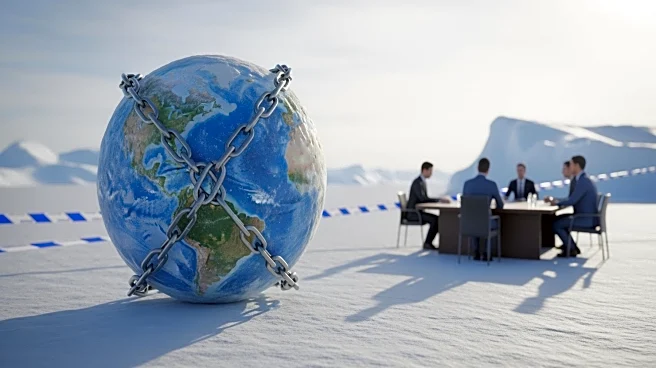What's Happening?
Russia has reportedly detained Leonid Pshenichnov, a Ukrainian Antarctic researcher, on charges of economic sabotage. Pshenichnov, who has over 40 years of experience in marine biology, has been involved
in research on biological resources in the Southern Ocean. He has been living in Crimea since the Russian occupation in 2014, continuing his work under a Ukrainian passport. His arrest occurred in September, just weeks before the annual Commission for the Conservation of Antarctic Marine Living Resources (CCAMLR) conference in Hobart, Australia. Ukraine's ambassador to Australia, Vasyl Myroshnychenko, has accused Russia of attempting to hinder Ukrainian activities in Antarctica. Pshenichnov has been a key figure in proposing new marine protected areas in Antarctica, a move opposed by Russia and China since 2017.
Why It's Important?
The arrest of Leonid Pshenichnov highlights the geopolitical tensions surrounding Antarctica, particularly concerning the conservation and use of its marine resources. Russia's actions are seen as an attempt to maintain its economic interests in the region, particularly in industrial fishing, which could be restricted by the proposed marine protected areas. This incident underscores the broader conflict between nations over the governance of Antarctica, with Russia and China opposing stricter regulations. The situation also raises concerns about the safety and freedom of scientists working in politically sensitive areas, potentially impacting international scientific collaboration and conservation efforts.
What's Next?
The international community, particularly members of the CCAMLR, may respond to Russia's actions with diplomatic pressure or calls for Pshenichnov's release. The ongoing opposition by Russia and China to the establishment of marine protected areas will likely continue to be a contentious issue in future CCAMLR meetings. The situation may also prompt discussions on the protection of scientists working in politically charged regions and the need for international agreements to safeguard their work and rights.
Beyond the Headlines
This development could have long-term implications for international relations in Antarctica, potentially affecting future negotiations on resource management and environmental protection. The arrest of a scientist for political reasons may lead to increased scrutiny of Russia's activities in the region and could influence other countries' policies towards scientific research and conservation in Antarctica.










